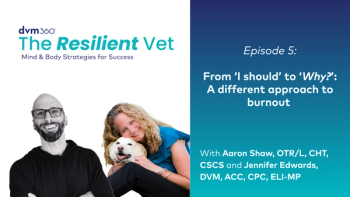
Reaching new heights
Once I discovered mountain climbing was something I could do, I wanted to push myself," says Dr. Michael Andrews. "When I was 20, I never thought I'd be doing something like this."
Once I discovered mountain climbing was something I could do, I wanted to push myself," says Dr. Michael Andrews. "When I was 20, I never thought I'd be doing something like this. It proves to me that I can still take on challenges."
In the clouds: Dr. Michael Andrews (red jacket and yellow boots) and his climbing team just 50 feet from the summit of Denali, towering at 20,320 feet. His climbing partner, Dr. David Granstrom, associate institute director with the U.S. Department of Agriculture, took the picture.
Dr. Andrews, owner of Woodcrest Veterinary Clinic in Riverside, Calif., and current AAHA president, has been climbing since the mid-1990s. He started with little experience and lots of ambition. He tried three times to reach the summit of 14,162-foot-tall Mount Shasta in California. Now, he's climbed mountains towering more than 20,000 feet. "It's like walking in the clouds," Dr. Andrews says.
His goal: To climb the Seven Summits, the highest peaks on each continent. So far, he has conquered Mount Kilimanjaro (19,340 feet), Denali (Mount McKinley; 20,320 feet), and Aconcagua (22,841 feet). As of press time, he'll add Mount Elbrus (18,506 feet) in Europe to the list. In coming years, Dr. Andrews plans to round out his climbing accomplishments with Carstensz Pyramid (16,023 feet), Vinson Massif (16,050 feet), and the mother of all climbs—Mount Everest at 29,035 feet. As if the sheer height wasn't enough, these monsters also serve up high winds and cold temperatures.
"I spent three days in camp on Denali, only going out to relieve myself and to get food. The guides cooked in their tent vestibules. The temperature was below zero; it was too windy and too cold to stand outside even with gear on for very long," he says. "Climbing is a very unique experience. Not too many people get to experience such extremes.
"This type of activity gives you balance, so you aren't consumed with practice day after day. The experience is so intense that it's not only possible, but mandatory that you clear your mind. Plus, I accomplish something difficult, I stay in shape, and I return to practice with a fresh attitude."
Editors' note: Tell us about your unique interests, extraordinary passions, crazy hobbies, and remarkable part-time endeavors. Write to us at
Newsletter
From exam room tips to practice management insights, get trusted veterinary news delivered straight to your inbox—subscribe to dvm360.




